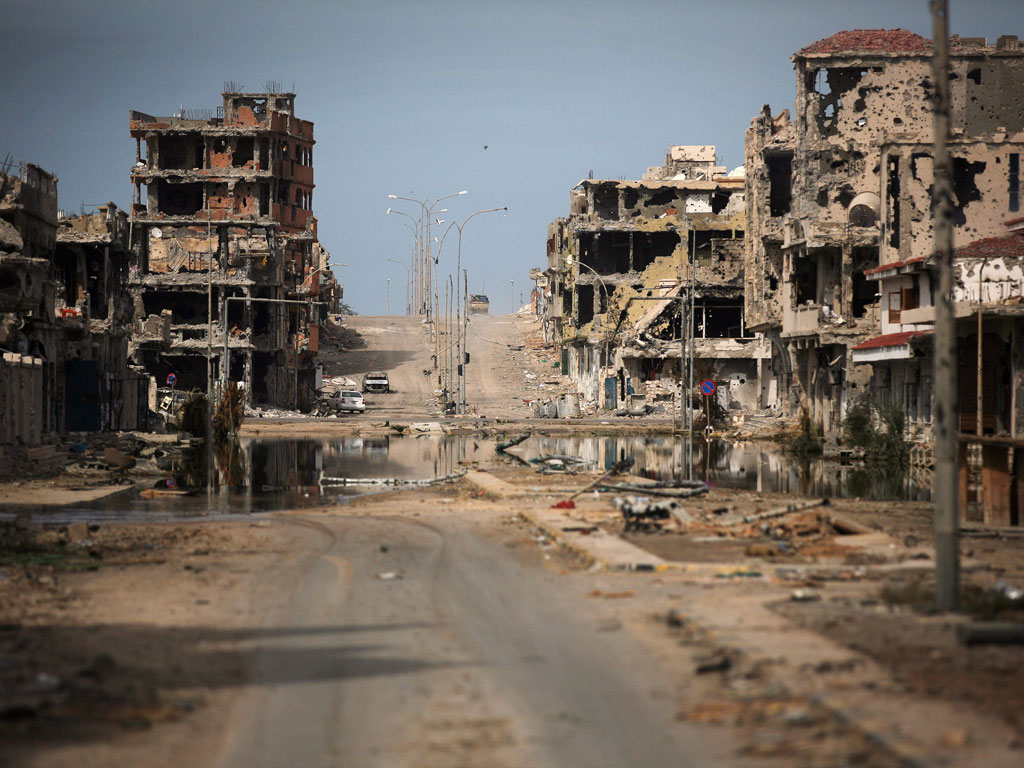SIRTE, Libya |
Nov 4 (Reuters) - Two weeks after Muammar Gaddafi was killed in his hometown, his tribal kin in Sirte, the village he turned into a favoured city, are seething with anger and fear, warning bad blood will poison Libya for years to come.
Just how far the rhetoric of vendetta may translate into action is hard to assess, but there is no mistaking the hatred for the triumphant rebels who ousted their kinsman, a hatred amplified by the abuse Gaddafi suffered after capture and the indignities his body was subjected to before its secret burial.
"Would you forget if someone killed your son unjustly? No you won't forget. People here will never forget," said Hajj Abu Mohammed, a member of Gaddafi's Gaddadfa tribe in Wadi Garif, the ousted strongman's desert birthplace close to Sirte.
"It will be blood feuds," he said, standing at a spot where locals said the graves of Gaddafi's mother and three other relatives had been emptied and desecrated by enemy fighters during the battle for Sirte that ended eight months of war.

People in Sirte are particularly hostile to fighters from Misrata, the next major city to the west, some 250 km (160 miles) away, whom they blame for the vandalising of the graves and much of the destruction and killings in Sirte -- including that of Gaddafi himself.
A long tribute to Gaddafi's mother, Aisha bin Niran, is written on the wall behind the graves. Next to it, freshly sprayed graffiti reads "Committee for Statue Demolition".
Many Libyans, especially from Misrata, which was badly damaged by bombardments during a siege by Gaddafi's forces, believe that fighters from Misrata are getting even with the people of Sirte for defending Gaddafi and destroying their city.
Stories of murder and rape by Gaddafi troops in Misrata are being told behind closed doors and fuelling anger. Gaddafi loyalists in Sirte and other desert areas around it are bitter towards the revolt that drove thousands from their homes.
SCATTERED REFUGEES
Hundreds of families with no place to go to after their houses have been demolished in the war are now scattered in villages around Sirte. Some stay with relatives. Others live in tents in the desert, deserted shacks and old school buildings.
They say anti-Gaddafi fighters went on looting and burning their properties even after the war was over and Gaddafi was dead. Residents tell stories of government fighters forcing them out of their cars at gunpoint and taking their vehicles away.
International human rights organisations have urged the new leadership in the National Transitional Council to ensure order and respect for civil rights, citing evidence of abuses. In one case, dozens of bodies, some with their hands bound, were found shot dead in a compound where pro-Gaddafi forces had been based.
"They stole our furniture, burnt our house and took our car," said Umm Khaled, as she sat in a tent that she shares with dozens of her family in the desert.
"What else remains in Libya? Why don't they just kill us and relieve us. They burnt the country and killed our leader.
"Let them finish it."
Many Sirte residents are still strong supporters of Gaddafi, while others simply long for a more prosperous and safer time under the man who ruled for 42 years, using Libya's oil wealth to buy favour with particular sections of society.
Some still keep Gaddafi's photos tucked secretly among their belongings, while many refer to him as the "Martyr Leader" - in his prime he chose to call himself the Brother Leader.
FOND MEMORIES
"We only have four things in life, do you understand me?" said one young girl, a resident of Sirte now living with her family in an abandoned school in Wadi Garif, as she raised her four fingers.
She then took this correspondent's notebook and pen and wrote "Allah, Muammar, Libya. And ... that's all." It was the ubiquitous chant of Libyans under the old order.
"We lived in security with Muammar, we never thought we will end up living in a school," she said. "Look around you, do you see any food aid from organisations or any officials visiting us? No one."
The gruesome display of Gaddafi's body in a cold room in Misrata for four days has also infuriated members of his tribe and Sirte residents, as did the eventual decision to bury it in secret in the desert, rejecting a request from his tribesmen to take the body and inter it according to custom.
"Our tribal sheikhs went to Tripoli to take the body of Muammar. But then the Misrata people refused to hand him over. They said he is not to be buried among Muslims," said Hajj Abu Mohammed. "We even dug the grave here to bury him. But they said no."
Another resident standing nearby said: "Even when he is dead, they are scared of him. Maybe they fear there will be an uprising or something if people knew where he was buried."
Many Libyans fear civil war could flare between tribes and regions if the NTC does not reconcile the animosity created by the war and deal with the legacy of weapons piled up across the country.
"Libya is a tribal culture, and if they do not ensure reconciliation between the tribes, it will turn into a blood bath," said Abdullah, a young member of the Gaddadfa tribe.
Another man from Sirte, Abu Najeeb, who now lives in a tent in the desert along with members of Hamamla tribe after their homes were destroyed, said: "It is not just about guns.
"I might have a big cannon, but if I am content, I will not hurt anyone.
"But if I do not get my rights back and I am not content," he added, as he moved his finger across his throat, "I can kill three people with a small knife." (Editing by Barry Malone and Alastair Macdonald )
No comments:
Post a Comment